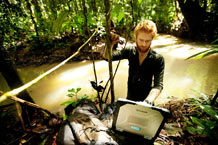
Lead Scientist Tim van Berkel making use of a Panasonic Toughbook to check camera traps in the field.
Exeter alumni return from Heart of Borneo
Two University of Exeter alumni have returned after leading a groundbreaking expedition to one of the most remote and unexplored regions on Earth.
The Heart of Borneo Project has seen an international team of researchers and media producers head to an area of rainforest in the very centre of the island of Borneo, in the Murung Raya district of Central Kalimantan.
They have spent two months camped out in the rainforest to survey the region’s wildlife for the first time, shedding light on its biodiversity.
Their mission has been such a success, it is hoped it will now become on ongoing project – with more trips planned over the next two years.
Martin Holland thought up the project while completing an Environmental Studies degree with the university’s Department for Lifelong Learning at the same time studying as a Marine & Natural History Photography degree with University College Falmouth at the Tremough Campus that the two institutions share in Cornwall.
He said the opportunity to combine science and the media to help protect the future of this fragile environment inspired the expedition:“The rainforests that are left in Borneo are highly threatened, but there are some ambitious conservation goals to protect them,” he said. “To make those initiatives work, they need to be well informed about biodiversity and the importance of those habitats.
“The Heart of Borneo Project aims to help those efforts by providing the essential information needed to make the best decisions about how to conserve these habitats and the species they are home to. Our aim is to discover, educate, and inspire.”
During the project, the expedition team stayed in contact with the outside world by creating videos of their work and staging live broadcasts. This included two live link-ups with the Natural History Museum in London, marking the first time images from this part of the world have ever been broadcast.
Tim van Berkel, another University of Exeter alumni, was the Lead Scientist on the expedition and oversaw the quest to note all the different species in the area.
Finds included sun bears, proboscis monkeys, and even the tracks of the enigmatic and rarely seen Borneo clouded leopard. The full-scale of the team’s findings is currently being analysed and they will be passing on their data to conservation organisations.
The team are hoping to take forward their research by continuing the Heart of Borneo Project with another expedition later this year, and then a more in-depth six month research trip in 2012.
Martin added: “It’s very tough being in the rainforest for that amount of time. It’s a testing environment that breaks you down slowly – it’s not a case of leopards or snakes leaping out at you, rather a slow process of being broken down by insects, parasites, and the heat.
“Despite that, I’m really looking forward to taking the research we’ve done on this expedition forward with further studies. There’s so much more we can find out about this area and its biodiversity, and we can use that information to educate people all over the world about the need to protect it.”
To mark their return to the UK, both Martin and Tim have been made Fellows of the Zoological Society of London, who helped fund the project.
The Heart of Borneo project has been funded in part by the University of Exeter, and also received backing from the WWF, Royal Geographical Society, and the New York Explorers Club.
To find out more about the project, log on to www.heartofborneo.org
Date: 30 March 2011
